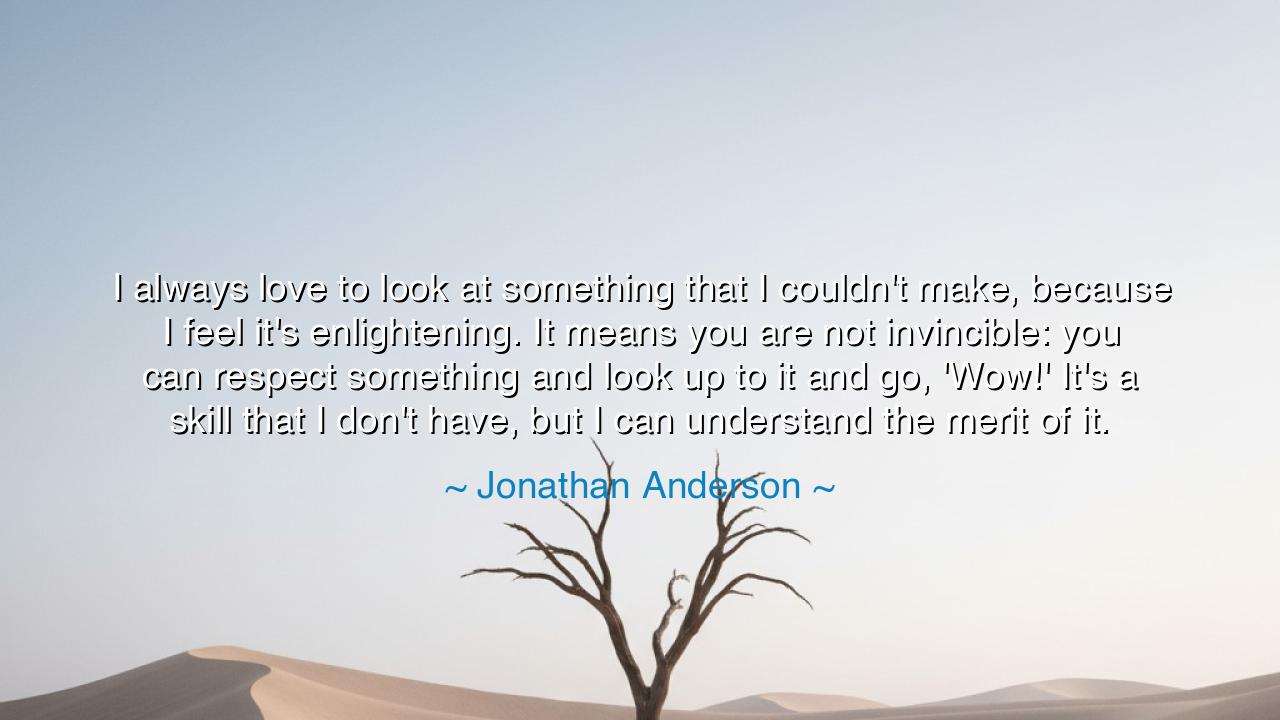
I always love to look at something that I couldn't make, because
I always love to look at something that I couldn't make, because I feel it's enlightening. It means you are not invincible: you can respect something and look up to it and go, 'Wow!' It's a skill that I don't have, but I can understand the merit of it.






Hear the wisdom of Jonathan Anderson: “I always love to look at something that I couldn’t make, because I feel it’s enlightening. It means you are not invincible: you can respect something and look up to it and go, ‘Wow!’ It’s a skill that I don’t have, but I can understand the merit of it.” These words rise like a clear bell through the noise of pride, calling us to humility, reverence, and wonder. For in a world that teaches us to compete and to conquer, Anderson reminds us of the ancient truth: no one soul holds every gift, and wisdom lies not in envy but in respect.
In the olden days, the Greeks spoke of techne, the mastery of craft, and of the Muses who bestowed arts upon mortals. The sculptor, the poet, the musician, the builder—all carried a spark divine, yet none could embody them all. To behold another’s gift was to be reminded of the vastness of human potential. Anderson echoes this same spirit: to witness a skill you lack is not shame, but revelation. It teaches the heart that to be human is not to be complete in oneself, but to dwell among the many who together create the tapestry of greatness.
Consider the story of Michelangelo, who painted the ceiling of the Sistine Chapel. Even Raphael, a master in his own right, stood in awe of what he saw. Rather than scorn, he honored Michelangelo’s genius, understanding that though he himself could not conjure the same vision, he could still respect its majesty. That humility, that recognition of another’s unique merit, did not diminish Raphael’s own greatness—it deepened it. For to bow before another’s gift is not defeat, but enlargement of the soul.
Anderson speaks too of the danger of thinking oneself invincible. To believe we can master all, that nothing is beyond us, is the seed of arrogance and folly. History bears witness: kings who thought themselves gods fell to ruin, and warriors who imagined themselves immortal met early graves. The wise, however, learn from what they cannot do. They see in it a mirror of their limits, and in that limit, they find truth. For true strength is not to know everything, but to acknowledge that others hold gifts we do not.
The meaning of his words is also a call to gratitude. How wondrous it is that the world is filled with crafts, arts, sciences, and skills beyond our reach! The music of a master violinist, the precision of a surgeon’s hand, the vision of an architect—all these enrich our lives, though we ourselves cannot replicate them. To say “Wow!” as Anderson does is not weakness; it is the posture of the heart that recognizes beauty in another and rejoices in it.
The lesson for us is plain: instead of envy, choose admiration; instead of pride, choose humility. When you see another’s gift, do not ask, “Why do I not possess it?” but rather, “How blessed the world is that such a gift exists.” In this practice lies harmony, for envy divides, but respect unites. By honoring each other’s strengths, we weave together the fullness of humanity.
What then shall we do? Let us train ourselves daily to marvel at what is beyond us. Watch the craftsman at work, listen to the singer, observe the dancer, read the poet, and whisper within yourself: “This too is a gift.” Celebrate the merit of others, for in lifting them up, you lift yourself. And never forget: no single star lights the sky alone—it is the company of countless stars that makes the heavens radiant.
Therefore, O listener, take these words into your heart: you are not invincible, and that is your glory. For in your limits, you are given the chance to marvel, to admire, and to rejoice in the endless variety of human skill. Respect what you cannot do, and in doing so, you will find yourself part of something greater than yourself—the eternal fellowship of humanity, bound not by pride, but by shared wonder.






AAdministratorAdministrator
Welcome, honored guests. Please leave a comment, we will respond soon